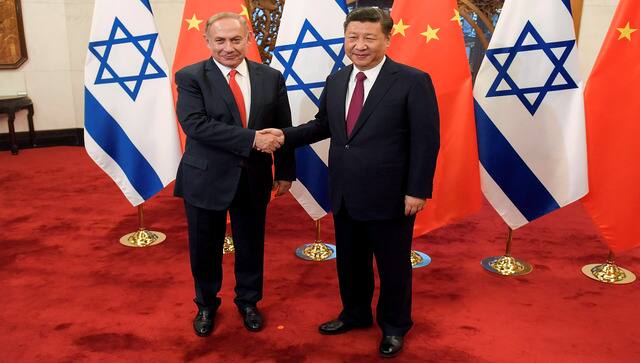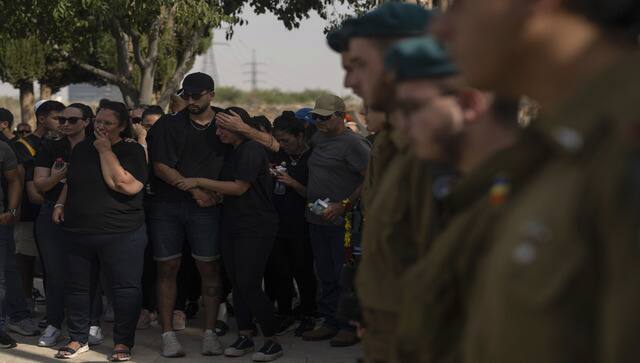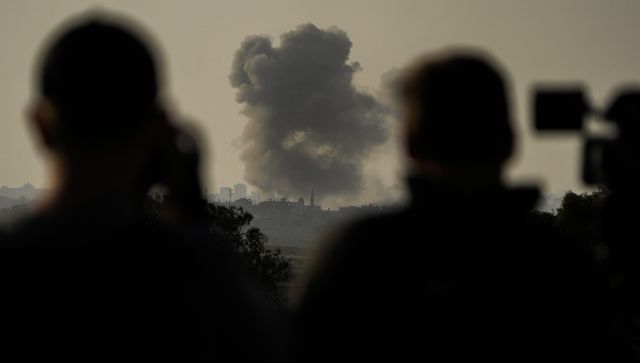After openly criticising Israel’s actions in Gaza, China has backed the West Asian nation’s “right to self-defence” against Hamas. This change in tone comes just days ahead of Chinese foreign minister Wang Yi’s visit to the United States. Beijing, which maintains good relations with Israel, has also supported the Palestinian cause for years. Let’s take a look at what’s happening. China’s ties with Israel and Palestinians In the mid-160s when Mao Zedong ruled China, the Asian giant sided with the Palestinians by giving weapons as well as vowing its support for their cause, as per The Washington Post report.
Beijing has for long called for a two-state solution.
China began opening up to the world after Mao’s death in 1976. It finally established relations with Israel in 1992 and since then has tried to keep good ties with both the warring sides, the report added. What did China say earlier? Commenting on the recent flare-up between Israel and Hamas, China called for a ceasefire, criticised Tel Aviv’s actions in Gaza earlier, and offered to play a peacemaker. The latest escalation started on 7 October after Hamas militants launched a surprise attack on Israel, killing over 1,400 people, mostly civilians, as per Israeli officials. Israel’s retaliatory strikes on the impoverished
Gaza Strip
have claimed the lives of over 5,000 Palestinians, according to the Hamas-run Health Ministry on Monday (23 October). So far, China has refrained from directly naming Hamas while denouncing violence. After the 7 October attack, a Chinese foreign ministry spokeswoman called for de-escalation and implementation of the two-state solution for an independent Palestine. A week after Hamas’ attack, China’s foreign minister Wang Yi strongly condemned Israel’s actions in Gaza, which he said have gone “beyond the scope of self-defence”. “It should listen earnestly to the calls of the international community and the United Nations secretary general, and cease its collective punishment of the people of Gaza,” he was quoted as saying by AFP. Wang had made the remarks on a call with his Saudi Arabian counterpart Prince Faisal bin Farhan. Speaking to US secretary of state Antony Blinken, Wang said that Washington should “play a constructive and responsible role” in the conflict, and suggested “the convening of an international peace meeting as soon as possible to promote the reaching of broad consensus”, reported AFP. On 19 October, China said it was “deeply disappointed” with the US for vetoing a UN Security Council resolution calling for a “humanitarian pause” in the Israel-Hamas fighting. In his first statement on the conflict, Chinese president Xi Jinping called for an immediate ceasefire during a meeting in Beijing with Egyptian prime minister Mostafa Madbouly last week. He also offered to join hands with Egypt and other Arab nations “to push for a comprehensive, just and lasting solution to the Palestinian issue as soon as possible”, reported Bloomberg. The Chinese president said it was “crucial to prevent the conflict from expanding or even losing control and causing a serious humanitarian crisis”. [caption id=“attachment_13289552” align=“alignnone” width=“640”] Israeli prime minister Benjamin Netanyahu and Chinese president Xi Jinping shake hands in Beijing, China in 2017. Reuters File Photo[/caption] China’s special envoy for the Middle East, Zhai Jun, who attended the Cairo peace summit hosted by Egypt on 22 October, said that Beijing believes “force is not a way to resolve” the conflict, as per CNA. Terming the situation in Gaza “very serious”, Zhai said Beijing is willing to do “whatever is conducive” to endorse dialogue, secure a ceasefire and restore peace, Al Jazeera report said citing China Central Television. He also said that the feared ground invasion and the prospect of the conflict spreading to other neighbouring countries in West Asia were “worrisome”, the report added. Zhai, who met Arab League chief Ahmed Aboul Gheit on the sidelines of the peace summit, had previosuly told the bloc that Beijing would “make unremitting efforts to get the Middle East peace process back on track”, according to AFP. Earlier,
Israel
publicly rebuked China, saying it was “deeply disappointed” at Beijing’s “official statements and media reports”, reported Bloomberg. A day after the 7 October attack by Hamas, Yuval Waks, a senior official at the Israeli Embassy in Beijing, had reportedly said: “When people are being murdered, slaughtered in the streets, this is not the time to call for a two-state solution”. What is China saying now? China’s foreign minister Wang told his Israeli counterpart Eli Cohen in a telephone call on Monday (23 October), “Every country has the right to self-defense but should abide by international humanitarian law and protect civilians,” Bloomberg reported citing China’s state-run Xinhua News Agency. As per the news agency, Wang reiterated that Beijing is “deeply concerned by the continued escalation of the conflict and the intensification of the situation” and “deeply saddened by the large number of civilian casualties caused by the conflict”. The Chinese foreign minister said that his country will “firmly support anything that is conducive to peace and will do its best as long as it is conducive to the reconciliation between Palestine and Israel”. [caption id=“attachment_13289562” align=“alignnone” width=“640”]
Israeli prime minister Benjamin Netanyahu and Chinese president Xi Jinping shake hands in Beijing, China in 2017. Reuters File Photo[/caption] China’s special envoy for the Middle East, Zhai Jun, who attended the Cairo peace summit hosted by Egypt on 22 October, said that Beijing believes “force is not a way to resolve” the conflict, as per CNA. Terming the situation in Gaza “very serious”, Zhai said Beijing is willing to do “whatever is conducive” to endorse dialogue, secure a ceasefire and restore peace, Al Jazeera report said citing China Central Television. He also said that the feared ground invasion and the prospect of the conflict spreading to other neighbouring countries in West Asia were “worrisome”, the report added. Zhai, who met Arab League chief Ahmed Aboul Gheit on the sidelines of the peace summit, had previosuly told the bloc that Beijing would “make unremitting efforts to get the Middle East peace process back on track”, according to AFP. Earlier,
Israel
publicly rebuked China, saying it was “deeply disappointed” at Beijing’s “official statements and media reports”, reported Bloomberg. A day after the 7 October attack by Hamas, Yuval Waks, a senior official at the Israeli Embassy in Beijing, had reportedly said: “When people are being murdered, slaughtered in the streets, this is not the time to call for a two-state solution”. What is China saying now? China’s foreign minister Wang told his Israeli counterpart Eli Cohen in a telephone call on Monday (23 October), “Every country has the right to self-defense but should abide by international humanitarian law and protect civilians,” Bloomberg reported citing China’s state-run Xinhua News Agency. As per the news agency, Wang reiterated that Beijing is “deeply concerned by the continued escalation of the conflict and the intensification of the situation” and “deeply saddened by the large number of civilian casualties caused by the conflict”. The Chinese foreign minister said that his country will “firmly support anything that is conducive to peace and will do its best as long as it is conducive to the reconciliation between Palestine and Israel”. [caption id=“attachment_13289562” align=“alignnone” width=“640”] Mourners attend the funeral of Erik Kraunik, the chief of security of Kibbutz Be’eri who was killed by Hamas militants, at Yehud cemetery, central Israel on 23 October. AP[/caption] This changed stance acknowledging Israel’s right to take action against Hamas comes as Wang is due to travel to Washington for a three-day visit from 26 October to 28 October. He will meet US secretary of state Antony Blinken and national security adviser Jake Sullivan to discuss a host of issues, including the Israel-Hamas conflict, Russia’s war with Ukraine and tensions in the South China Sea, reported Associated Press (AP). The US has asked Beijing to stand with Israel and condemn Hamas’ attack earlier, noted Bloomberg. What’s China’s goal in West Asia? According to The Washington Post, China is trying to achieve two key diplomatic goals – bolstering itself as the “champion” of developing countries and posturing itself as an alternative to the US in a multipolar world. Describing itself as a “friend to both Israel and Palestine”, Beijing has vowed to “conduct impartial conciliation and mediation” to resolve the conflict. “The fact that Palestine is such an emotional and hot-button political issue for the Middle East (West Asia) means that when China offers rhetorical support to Palestine, they’re going to speak not just to the Palestinians, but also to those other Arab countries that want to see a great power support them on this issue,” Jonathan Fulton, a nonresident fellow at the think tank Atlantic Council, told The Washington Post. Analysts believe China’s positioning stems from its strategic and economic interests in West Asia as well as its initial opposition to Israel – a staunch US ally, reported Indian Express. Beijing pulled a surprise in March by brokering a deal between arch-rivals Iran and Saudi Arabia to re-establish diplomatic relations, bringing the world’s attention to China’s growing ambitions in West Asia. As China and the US seek to mend relations, Beijing seems to have changed its stance on Israel’s retaliatory actions. But it remains to be seen how far it will go to support Israel. According to The Washington Post, in case the fighting spreads to other West Asian nations, analysts say China’s “calculation” might change. However, for now, it appears that Beijing will use the situation to one-upmanship over the US in the region. With inputs from agencies
Mourners attend the funeral of Erik Kraunik, the chief of security of Kibbutz Be’eri who was killed by Hamas militants, at Yehud cemetery, central Israel on 23 October. AP[/caption] This changed stance acknowledging Israel’s right to take action against Hamas comes as Wang is due to travel to Washington for a three-day visit from 26 October to 28 October. He will meet US secretary of state Antony Blinken and national security adviser Jake Sullivan to discuss a host of issues, including the Israel-Hamas conflict, Russia’s war with Ukraine and tensions in the South China Sea, reported Associated Press (AP). The US has asked Beijing to stand with Israel and condemn Hamas’ attack earlier, noted Bloomberg. What’s China’s goal in West Asia? According to The Washington Post, China is trying to achieve two key diplomatic goals – bolstering itself as the “champion” of developing countries and posturing itself as an alternative to the US in a multipolar world. Describing itself as a “friend to both Israel and Palestine”, Beijing has vowed to “conduct impartial conciliation and mediation” to resolve the conflict. “The fact that Palestine is such an emotional and hot-button political issue for the Middle East (West Asia) means that when China offers rhetorical support to Palestine, they’re going to speak not just to the Palestinians, but also to those other Arab countries that want to see a great power support them on this issue,” Jonathan Fulton, a nonresident fellow at the think tank Atlantic Council, told The Washington Post. Analysts believe China’s positioning stems from its strategic and economic interests in West Asia as well as its initial opposition to Israel – a staunch US ally, reported Indian Express. Beijing pulled a surprise in March by brokering a deal between arch-rivals Iran and Saudi Arabia to re-establish diplomatic relations, bringing the world’s attention to China’s growing ambitions in West Asia. As China and the US seek to mend relations, Beijing seems to have changed its stance on Israel’s retaliatory actions. But it remains to be seen how far it will go to support Israel. According to The Washington Post, in case the fighting spreads to other West Asian nations, analysts say China’s “calculation” might change. However, for now, it appears that Beijing will use the situation to one-upmanship over the US in the region. With inputs from agencies
)